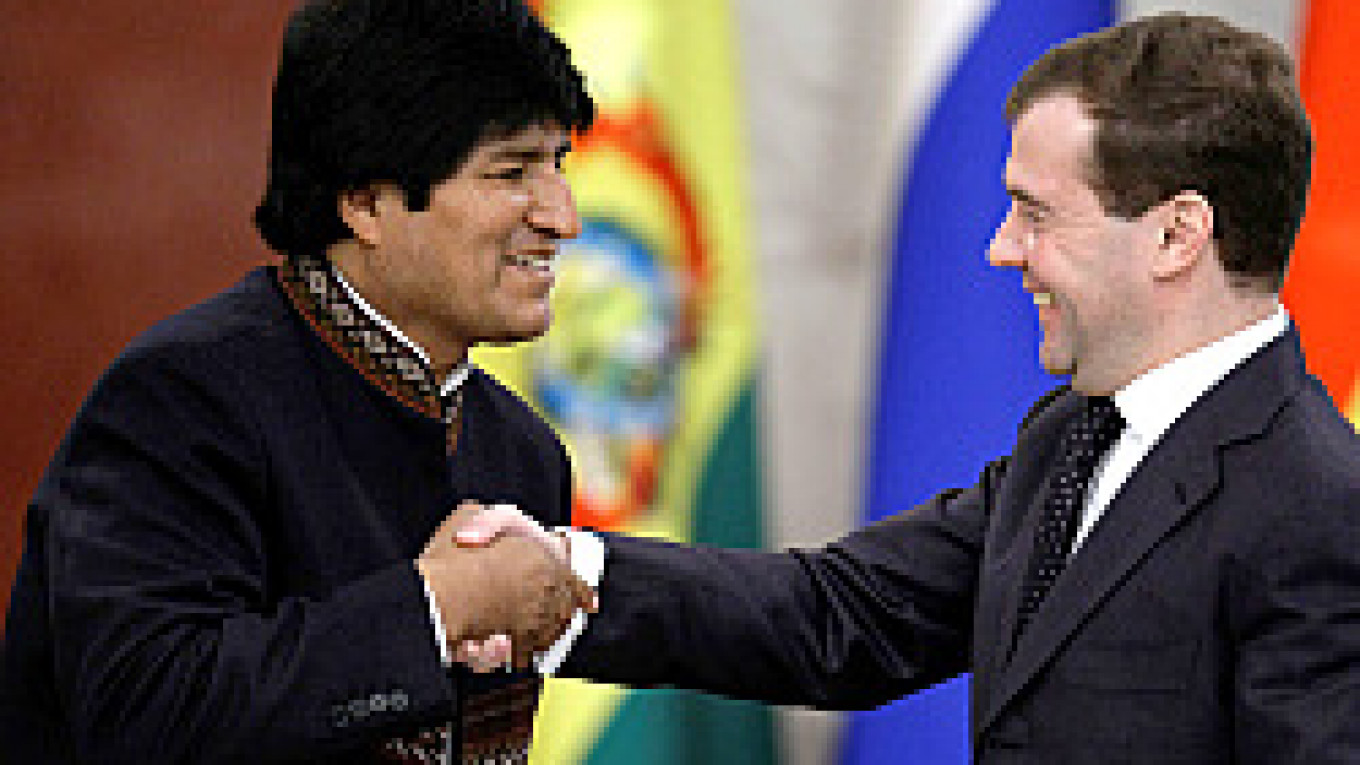The moves are part of Moscow's push for more clout in Latin America. Bolivian President Evo Morales became the first leader from the landlocked Andean nation to visit Russia since Moscow and La Paz established diplomatic relations in 1945.
Morales and Medvedev signed a declaration emphasizing their similar positions on global issues and opposition to U.S. policies, including the decades-old embargo against Cuba, plans for a missile shield in Europe and NATO expansion.
Morales praised the resurgence of Russian attention to Latin America. Medvedev met with Morales in November during a regional tour that included Venezuela, Brazil, Peru and Cuba.
"Russia's return to the region is very important," Morales told a joint news conference.
Medvedev said Russia's activities in Latin America are not aimed at undermining the United States. But plans to provide Bolivia with helicopters follow disputes with Washington over anti-narcotics efforts. Morales expelled the U.S. ambassador in September and suspended operations of the U.S. Drug Enforcement Administration, which he accused of spying. Before leaving for Moscow, he said he would discuss the immediate purchase of helicopters and loans of other aircraft to fight production of coca, the main ingredient in cocaine.
Medvedev and Morales oversaw the signing of agreements calling for cooperation in the arms trade and anti-narcotics efforts. Medvedev indicated that Russia expects to reach a deal to provide helicopters soon. "We hope that implementation of the first large contract, for the supply of Russian helicopters to Bolivia, will begin in the very near future," Medvedev said.
Medvedev did not say how many helicopters Moscow might provide, but Russia's top arms sales official, Mikhail Dmitriyev, suggested that it would be fewer than 20.
Dmitriyev said Venezuela is also interested in other Russian weapons and that Russia might loan Bolivia money to buy the helicopters and other arms.
Medvedev stressed the importance of energy cooperation and said state-owned gas giant Gazprom has signed memorandums to establish a "strategic project" for long-term involvement in Bolivia. "We are talking about the Russian side helping our friends from Bolivia in the development of hydrocarbons and the construction of a gas transport system on the territory of Bolivia," Medvedev said.
A Message from The Moscow Times:
Dear readers,
We are facing unprecedented challenges. Russia's Prosecutor General's Office has designated The Moscow Times as an "undesirable" organization, criminalizing our work and putting our staff at risk of prosecution. This follows our earlier unjust labeling as a "foreign agent."
These actions are direct attempts to silence independent journalism in Russia. The authorities claim our work "discredits the decisions of the Russian leadership." We see things differently: we strive to provide accurate, unbiased reporting on Russia.
We, the journalists of The Moscow Times, refuse to be silenced. But to continue our work, we need your help.
Your support, no matter how small, makes a world of difference. If you can, please support us monthly starting from just $2. It's quick to set up, and every contribution makes a significant impact.
By supporting The Moscow Times, you're defending open, independent journalism in the face of repression. Thank you for standing with us.
Remind me later.






